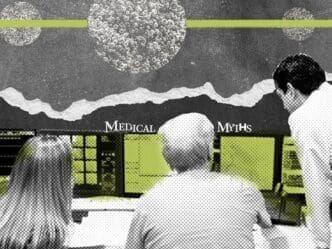Inflammatory Bowel Disease (IBD), which encompasses Crohn’s disease and ulcerative colitis, impacts millions worldwide. Despite its prevalence, misconceptions about the condition persist. This article explores and dispels twelve common myths surrounding IBD to facilitate a better understanding of the disease.
IBD is often confused with irritable bowel syndrome (IBS), perhaps due to their acronyms and shared symptoms like bloating and abdominal pain. However, as Dr. Abhik Bhattacharya clarifies, IBS involves the gut-brain interaction resulting in symptoms like diarrhea or constipation, aggravated by stress. In contrast, IBD is an immune-related condition causing gastrointestinal damage and symptoms such as severe belly pain, weight loss, and fatigue.
Contrary to popular belief, stress is not a direct cause of IBD, although it can exacerbate the symptoms and trigger flare-ups. Dr. Bhattacharya emphasizes that stress may worsen the situation but does not cause the disease itself.
Another myth is the supposed link between personality types and IBD. Research has found no evidence connecting personality traits to the development of IBD, according to Dr. Bhattacharya.
People sometimes think they can have both Crohn’s disease and ulcerative colitis simultaneously. Although both are forms of IBD, they are distinct diseases. Dr. Bhattacharya notes that while diagnosing can be challenging, these conditions do not coexist.
It’s a misconception that there are no treatments available for IBD. Dr. Bhattacharya highlights several effective treatments, including biologic medications and immunosuppressants, and notes ongoing advancements in clinical trials.
The necessity for surgery in IBD patients has significantly decreased with the advent of potent medications. While some patients might require surgery, many can manage the disease effectively without it, aiming to prevent surgical intervention through early treatment.
Pregnancy and IBD medications can safely coexist in most cases. Despite myths to the contrary, most IBD medications are safe during pregnancy, except for methotrexate, which should be stopped if planning to conceive.
When symptoms of IBD subside, it might seem logical to stop medication, but Dr. Bhattacharya warns against this. Discontinuing treatment can lead to symptom recurrence and reduced efficacy of medications upon re-administration.
A gluten-free diet may help those with celiac disease, but it does not cure IBD. Dr. Bhattacharya makes it clear that while dietary adjustments are essential, they do not replace medical treatment for IBD.
IBD is often thought to affect only the gut, but it can impact many body systems, including the skin, eyes, and joints. This involvement of various organs poses challenges for managing the disease, requiring a comprehensive approach.
Currently, there is no cure for IBD. Research continues to progress toward better therapies, with the ultimate goal of finding a cure, as Dr. Bhattacharya indicates.
Lastly, the myth that IBD prevents individuals from leading normal lives is unfounded. With appropriate treatment, individuals with IBD can enjoy full, active lives, as demonstrated by many successful public figures.
Misunderstandings about IBD can affect the lives of those diagnosed with the condition. Distinguishing facts from myths is crucial for effective treatment and management. As more information becomes available and treatments improve, individuals with IBD can expect better outcomes and quality of life.
Source: Medicalnewstoday








